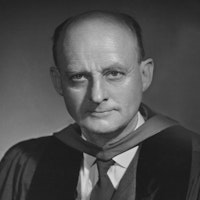One of the most fruitful sources of self-deception in the ministry is the proclamation of great ideals and principles without any clue to their relation to the controversial issues of the day.
One of the most fruitful sources of self-deception in the ministry is the proclamation of great ideals and principles without any clue to their relation to the controversial issues of the day.
Reinhold Niebuhr

Controversial Situations
Topic: Wisdom & Understanding
“One of the most fruitful sources of self-deception in the ministry is the proclamation of great ideals and principles without any clue to their relation to the controversial issues of the day…. I have myself too frequently avoided the specific application of general principles to controversial situations to be able to deny what really goes on in the mind of the preacher when he is doing this.”
Reinhold Niebuhr (born June 21, 1892, in Wright City, Missouri – died June 1, 1971, in Stockbridge, Massachusetts) was an American theologian, ethicist, and public intellectual whose thought profoundly shaped modern Christian ethics and political philosophy. The son of German immigrant parents—his father a pastor in the Evangelical Synod—Niebuhr grew up in a household marked by faith, intellectual curiosity, and moral seriousness. After studying at Elmhurst College and Eden Theological Seminary, he completed his education at Yale Divinity School, where he began forming a theology deeply attuned to the social and ethical questions of the modern world. Ordained in 1915, he soon accepted a pastoral call in Detroit, where the stark realities of industrial labor, economic exploitation, and racial inequality began to sharpen and redirect his moral vision.
During his thirteen years in Detroit, Niebuhr confronted firsthand the tensions of industrial capitalism and the limits of individual idealism, insights that would lead to the development of his influential perspective known as Christian realism. Rejecting both sentimental optimism and rigid dogmatism, he emphasized the persistence of human sin, self-interest, and collective pride—even within movements seeking justice. His later academic career at Union Theological Seminary in New York brought him international recognition. Through seminal works such as Moral Man and Immoral Society (1932) and The Nature and Destiny of Man (1941–43), he argued that while love remains the highest moral ideal, in political life it is necessarily mediated through justice, compromise, and restraint. His writings profoundly shaped generations of theologians, philosophers, and public leaders wrestling with the complexities of democracy, power, and responsibility.
A critic of totalitarianism, nationalism, and moral complacency alike, Niebuhr defended democratic ideals while warning against prideful illusions of innocence. His famous “Serenity Prayer” reflects his practical spirituality: the courage to change what must be changed, the serenity to accept what cannot, and the wisdom to discern the difference. Though illness limited his work in his later years, he remained a moral voice calling for humility, vigilance, and compassion in a world marked by conflict and ambiguity. Niebuhr’s legacy endures as a reminder that faith must not retreat from the world’s struggles but must engage them with honesty, realism, and hope.
Leaves from the Notebook of a Tamed Cynic
Niebuhr, Reinhold. Leaves from the Notebook of a Tamed Cynic. New York: Living Age, 1957, pp. 218-19,

Reinhold Niebuhr
Copyright © 2017 – 2026 LuminaryQuotes.com About Us

Martin E. Marty: Reinhold Niebuhr: Public Theology and the American Experience
His [Niebuhr’s] first book was dedicated to his pastor father and to his mother “who for twelve years had shared with me the work of a Christian pastorate,” [at the Bethel Evangelical Church, Detroit, Michigan] one which was memorialized in his most nearly autobiographical work, a sketchbook called Leaves from the Notebooks of a Tamed Cynic.
Later, during his subsequent career at New York’s Union Theological Seminary, he said “that the Detroit facts determined my development more than any books which I may have read”–(“Intellectual Autobiography”).
Ten years after moving to New York he said “Even at Union the gradual unfolding of my theological ideas [had] come not so much through study as through the pressure of world events.”–[Ten Years that Shook my World,” Christian Century, April 26, 1939, p. 545].
–Martin E. Marty [Reinhold Niebuhr: Public Theology and the American Experience, The Journal of Religion, Vol. 54, No. 4, Oct., 1974) pp. 332-359.